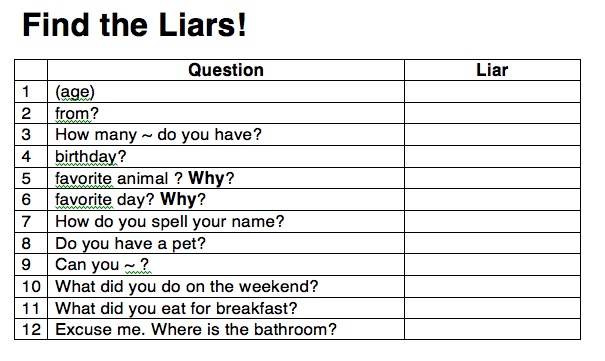Liars Game for English Conversation Class
English Level: Elementary to Advanced
No. of Students: 5-40
Strengths: Communication, Review, Fun
Basic Idea: Students ask a series of questions to each other and try to figure out who is lying.

I teach at a Japanese elementary school (in Europe). I did this liar game with my grade 6 class today. The students enjoyed the activity very much. With 12 students, we spent 20 minutes playing, and we only finished 30% of the worksheet (we'll continue next class -- it can take some time if you have lots of questions.)
Let me explain the liars game to you.
Instructions:
1) Preparation: Make a list of questions you want to review on a worksheet like the one below. Try to think of as many questions as students you have in your class. For example, I have 12 students in my class, so I thought of 12 English questions I wanted them to ask each other (see below).
2) Give the worksheet out to the students. Before you explain the activity, make sure they understand and can ask all of the questions. As you can see below, for some questions I didn't write the full question (e.g. #4). When they see "birthday?" they know they should ask "When is your birthday?". I prefer this method to having them just reading the question off the worksheet.
3) Teach the meaning of "Liar!" if they don't know it already. To do this, I had my assistant teacher ask me "How old are you?" and I answered that I was 16. My students knew this wasn't right. I told them I was a liar and wrote the word on the board.
4) Secretly (without the other students noticing), assign each student a number which corresponds to a question. For me, I gave them each a number on a piece of paper. You could also whisper the number to them.
5) Tell them that they must now stand up and ask the questions to each other. HOWEVER, when they are asked the question that corresponds with the number they were given, they must tell a lie. They should answer all the other questions truthfully.
Tell them that the purpose of the game is to find out who the liar is for all of the questions. Once they do this, they can sit down.
6) Have them stand up and ask questions to each other. If they think someone is lying, they should write his/her name down on the worksheet beside the question they asked. In my class, I only let students ask two questions to a student at a time. After that, they had to change partners. I did this so they wouldn't just ask each person all of the questions on the worksheet in order in one go. (I thought that would be boring.)
7) Once the activity is finished and the students have sat down, see who guessed correctly. If you want to have them share their answers in English, you could have them say something like "Kousuke said he is 12 years old, but he is a liar."
The students who have all the correct answers win.
Cultural note: In some languages (such as Japanese), it's not too offensive to call someone a liar (saying "You are a liar!" is a common in Japan). However, in English, when you say "You are a liar!", it can sound strong and offensive. I told my students that this game is about finding the liar, but they should not call people liars in real life (instead, they can say something like "really???" or "you're joking!").
Enjoy the liars game. It's easy to prepare for and great for review.
- Matthew Barton / Englishcurrent.com


it is a useful way
Thank you, it is very useful !
Very helpful! Thanks a lot!
cool